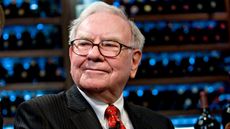Investment Gurus
The latest news, updates and opinions on Investment Gurus from the expert team here at MoneyWeek
-

The flaw in Terry Smith’s strategy at Fundsmith
Opinion Fundsmith has invested in some excellent companies, but it has struggled to decide when to sell, says Max King
By Max King Published
Opinion -

What is Steve Ballmer's net worth?
Steve Ballmer was Microsoft’s CEO from 2000 to 2014, and his huge net worth comes from his position at the top of the tech company
By Jacob Wolinsky Last updated
-

How Warren Buffett built his fortune
Analysis Warren Buffett is considered by many to be the best investor of all time. We examine how much Buffett is worth and how he made his fortune.
By Rupert Hargreaves Published
Analysis -

The US is in one of the greatest bubbles in financial history
Cover Story Jeremy Grantham, who has a history of getting big calls right, fears slumps in several wildly overpriced markets (including UK property). He tells Merryn Somerset Webb what investors should do now
By Merryn Somerset Webb Published
Cover Story -
Why investment forecasting is futile
Opinion Every year events prove that forecasting is futile and 2020 was no exception, says Bill Miller, chairman and chief investment officer of Miller Value Partners.
By MoneyWeek Published
Opinion -
Bill Ackman: beware of short-term market volatility
Opinion Bill Ackman, founder of the Pershing Square hedge fund, is upbeat on prospects for markets in 2021, but is worried about short-term volatility as coronavirus takes its toll.
By moneyweek Published
Opinion -
Mark Mobius: Lockdowns are a losing game
Opinion An easing up of lockdown efforts is likely to mean ”economic recovery at the end of this year and the beginning of next year”, says Mark Mobius, co-founder of Mobius Capital Partners.
By moneyweek Published
Opinion -
Will Danoff: buy firms that are doing well right now
Opinion Forget future earnings, says Will Danoff, portfolio manager at Fidelity. What matters is now.
By MoneyWeek Published
Opinion -
Anatole Kaletsky: I was wrong to be bearish on stocks
Opinion There are “three clear reasons” for equity markets to keep climbing, says Anatole Kaletsky, chief economist at Gavekal.
By moneyweek Published
Opinion
